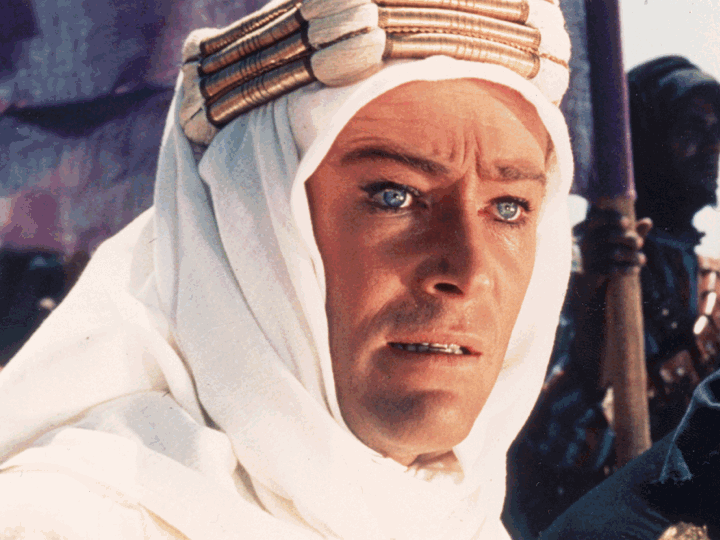DeMille’s Re-Released ‘Commandments’--Better Than Ever
- Share via
Paramount follows its successful reissue of “Funny Face” with Cecil B. DeMille’s 1956 “The Ten Commandments,” which opens today at the Cinerama Dome in 70mm Super VistaVision and six-track stereo and at the Crest in a fresh print with 35mm Dolby stereo. The movie is introduced by DeMille, who says that its theme is whether mankind is “to be ruled by God’s law or the whims of a dictator.”
DeMille’s film is the last classic Hollywood spectacle made by a silent-era pioneer with deep Victorian sensibilities. (Many of the films’ scenes have the look of Sir Lawrence Alma-Tadema paintings.) DeMille was never less than entertaining, and here he is stirring; critic Andrew Sarris has called DeMille “the last American director who enjoyed telling a story for its own sake.”
Charlton Heston has endured parting-the-Red Sea jokes for 35 years, but his Moses is a great heroic portrayal in which his physical presence is more than matched with an eloquent passion and conviction. He had, too, a worthy adversary in Yul Brynner’s exotic, muscular Rameses. (Anne Baxter’s Nefretiri is another matter: her heavy vamping could have used the light touch Claudette Colbert brought to Poppaea in DeMille’s “The Sign of the Cross.”)
In addition to the famous Red Sea sequence, the set pieces include the Exodus itself, the building of a monumental treasure city, the worship of the Golden Calf orgy and Moses receiving the Commandments on Mt. Sinai. Yet in a film with a cast of 25,000 --the roster runs from Herb Alpert to H. B. Warner, star of DeMille’s “The King of Kings”--it’s surprising to realize how much of the film is chamber drama, all of it theatrical and much of it quite moving.
“The Ten Commandments” plays at the Cinerama Dome through Monday and at the Crest through May 24, where it may be held over if the audience warrants.
The fifth Los Angeles Asian Pacific American International Film Festival continues this weekend at UCLA’s Melnitz Theater and is highlighted by a 7:30 p.m. Saturday screening of “The Tale of Chun-Hyang” (1978). This two-part, 155-minute romantic epic, adapted from an 18th-Century novel-in-verse, is old-fashioned, leisurely and has subtitles in stilted English, but is worth the effort for serious film lovers--and not merely just because North Korean films are all but unavailable in the West.
The story of a beautiful woman’s pure, unshakable love is the kind of material from which Japan’s Kenji Mizoguchi wrought masterpieces of subtlety and tragic irony. Directors U Won Jun and Yun Ryang Kyo aren’t remotely in Mizoguchi’s league, but they, their writers and their cast clearly bring a passionate commitment to the film. They also bring a political dimension to the telling of this period tale, putting more emphasis on the dire plight of the poor and the cruelty of a rigid caste system than on the terrible, virtual non-status of women.
Yet if ever a woman was oppressed it is the exquisite Chun-Hyang (Kim Song Yuk), the daughter of a woman vaguely described as a “dancing girl” and a nobleman she has never known. History looks to be repeating itself when Chun-Hyang herself falls in love with Master Li (Choe Sun Gyu), the wimpy son of a powerful nobleman who marries her secretly and foolishly promises never to abandon her.
The film’s costumes and settings are gorgeous, and its operatic quality is heightened by a sound-track chorus lamenting Chun-Hyang’s plight.
Screening at 5:30 is Steven Okazaki’s half-hour documentary “Days of Waiting,” a stunning, understated account of the life and art of Estelle Peck Ishigo, who joined her Japanese-American husband in a World War II concentration camp and recorded her experience in sketches, watercolors and writings; her story cries out to be dramatized in a feature film.
For full festival schedule: (213) 206-FILM, 206-8013, 687-4848.
More to Read
Only good movies
Get the Indie Focus newsletter, Mark Olsen's weekly guide to the world of cinema.
You may occasionally receive promotional content from the Los Angeles Times.










